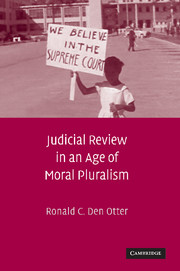Book contents
- Frontmatter
- Contents
- Acknowledgments
- Introduction
- 1 Public Justification and Constitutional Theory
- 2 Freedom and Equality in Constitutional History
- 3 The Challenge of Public Justification
- 4 Competing Conceptions of Public Reason
- 5 Constitutional Public Reason
- 6 The Limits of Public Justification
- 7 Standard Objections to Public Reason
- 8 Easier Cases
- 9 Harder Cases
- 10 The Case for Judicial Review
- Conclusion
- References
- Index
- References
Introduction
Published online by Cambridge University Press: 17 December 2010
- Frontmatter
- Contents
- Acknowledgments
- Introduction
- 1 Public Justification and Constitutional Theory
- 2 Freedom and Equality in Constitutional History
- 3 The Challenge of Public Justification
- 4 Competing Conceptions of Public Reason
- 5 Constitutional Public Reason
- 6 The Limits of Public Justification
- 7 Standard Objections to Public Reason
- 8 Easier Cases
- 9 Harder Cases
- 10 The Case for Judicial Review
- Conclusion
- References
- Index
- References
Summary
The purpose of this book is to explain how judicial review can be justified in a country like our own, which is committed to democratic self-rule but also to the freedom and equality of all of its members. A striking feature of the contemporary American political landscape is the prominence of the judiciary in making important constitutional choices that many other democratic countries leave to the people or to their elected representatives. There used to be something characteristically American about turning the most divisive political questions into legal questions with the hope that courts could answer them and thereby defuse political conflict. At the same time, the practice of judicial review has engendered understandable worries about the appropriate relationship between legislative and judicial power. Alexander Bickel once referred to judicial review as a “deviant institution” in a democracy. A number of conservative critics of judicial activism have used what Bickel called the “counter-majoritarian difficulty” in trying to show that the judiciary is the most dangerous branch. Robert Bork has written, “The progression of political judging, judging unrelated to law,…has greatly accelerated in the past few decades and now we see theorists of constitutional law urging judges on to still greater incursions into Americans' right of self-government.” According to Bork, America is “helpless before an antidemocratic, indeed a despotic, judiciary.” Lino Graglia has alleged that “the Constitution has been made the means of depriving us of our most essential right, the right of self-government.”
- Type
- Chapter
- Information
- Judicial Review in an Age of Moral Pluralism , pp. 1 - 21Publisher: Cambridge University PressPrint publication year: 2009



